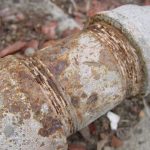Sadly, the answer for most people is no. This is a real problem because a large volume of water can be released quickly during a plumbing emergency. Water can cause a lot of damage in a short space of time and it’s important to act quickly to minimize the problems. The first thing to remember is that you cannot react well if you panic and the best way to avoid panicking is to understand the issues ahead of time. In this brief guide, we will help you to understand what you need to be doing during a plumbing emergency.
Why Does a Plumbing Emergency Happen?
Modern plumbing systems are complex, we rely on them every day and yet we tend to take them for granted. Why? Well, most of the pipes and fixtures that bring water into our homes and remove waste are hidden.
A certain level of higher water pressure is required to bring that fresh water in and a lower pressure of water carries it out. The water pressure that feeds a showerhead can force water through a cracked pipe or a leaky faucet. If the water pressure is too high it wants to find weak points where it can escape easily and this causes damage.
When it comes to wastewater drainage, the pull of gravity may be insufficient to draw the wastewater into the drain. In fact, those drains may be clogged with grease and other debris that closes the drain over time. When the pipe diameter narrows it may be necessary to change the pressure with a plunger or break apart debris with an auger (plumbing snake).
It’s important to understand that a relatively slow leak could waste as much as 15 gallons of water every day. To put this into some perspective this is the same volume of water that you would use to fill a bath. A “minor” annoying faucet or pipe leak will become worse as time passes and this can lead to an expensive repair bill.
Dealing with a Plumbing Emergency
To minimize water damage the first action should always be to shut-off the water supply. Every plumbing fixture has a dedicated shut-off valve and there is a main water shut-off valve near the water meter. You can shut-off the exact fixture or the better approach in an emergency is to shut-off the mains and then every other valve to be safe.
During flooding, you need to shut-off the power to avoid risks of electrocution. If the water rises above ½” high, you will need a professional plumber with extensive water damage experience. Repairing and restoring a home with that much water damage is beyond the scope of a DIY project.
If you can smell gas or sewer odor, you must leave the home because the situation is potentially dangerous. If the plumbing emergency has occurred out of hours, contact your local plumber on their 24/7 emergency line. To speed up this process, find a local professional plumber with a good reputation ahead of time and store their number.





